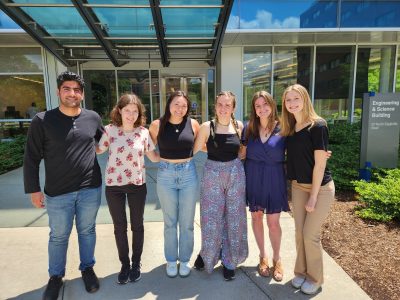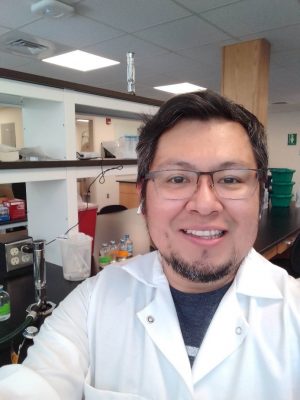2024 SURF Awards
Keertana Chagari ’25 (Molecular and Cell Biology, CLAS) Project Title: Reproducible Bioinformatic Workflows to Produce Diploid Phased Eukaryotic Genome Assemblies Faculty Mentor: Dr. Jill Wegrzyn, Ecology and Evolutionary Biology
Peter Fatzinger ’26 (Molecular and Cell Biology, CLAS) Project Title: Dynamic Changes in Chromosome Territories During Early Drosophila Embryogenesis Faculty Mentor: Dr. Jelena Erceg, Molecular and Cell Biology
Ryan Frier ’25 (Molecular and Cell Biology & Statistics, CLAS) Project Title: Investigating the Role of Actin Nucleation Factors in Mitosis Faculty Mentor: Dr. Kenneth Campellone, Molecular and Cell Biology
Suheera Haq ’26 (Molecular and Cell Biology & Individualized Major, CLAS) Project Title: Assessing the Role of BRD4 in Chlorine-Induced Lung Injury and Inflammation Faculty Mentor: Dr. Ley Smith, Pharmaceutical Sciences
Anthony He ’26 (Molecular and Cell Biology, CLAS) Project Title: Assembly and Annotation of a Chromosome-Scale Reference Genome for the Golden Conure (Guaruba guarouba) Faculty Mentor: Dr. Jill Wegrzyn, Ecology and Evolutionary Biology
Emmanuel Hernandez ’25 (Molecular and Cell Biology & Physiology and Neurobiology, CLAS) Project Title: How The Effects of a Forest Fire Change Ant and Fungus Microbiomes Faculty Mentor: Dr. Jonathan Klassen, Molecular and Cell Biology
Ruiwen Lin ’25 (Molecular and Cell Biology & Ecology and Evolutionary Biology, CLAS) Project Title: Exploring Hybridization in Lungless Salamanders Faculty Mentor: Dr. Hunmin Jung, Pharmaceutical Sciences
Nora Lippai ’26 (Molecular and Cell Biology, CLAS) Project Title: Viral-Induced Readthrough Transcription: Characterizing Viral Tactics to Impede Transcription Termination Faculty Mentor: Dr. Leighton Core, Molecular and Cell Biology
Kira O’Brien, Dec. ’24 (Molecular and Cell Biology, CLAS) Project Title: Investigating Bacterial Glycan Utilization in the Reproductive Organ of Euprymna scolopes Using Metagenomic and Cell Culture Approaches Faculty Mentor: Dr. Spencer Nyholm, Molecular and Cell Biology
Bianca Planeta ’25 (Molecular and Cell Biology, CLAS) Project Title: Investigating the Role of ORF1 in the Transposition of the Centromere-Enriched Retroelement G2/Jockey-3 Faculty Mentor: Dr. Barbara Mellone, Molecular and Cell Biology
Arianna Roach ’25 (Molecular and Cell Biology, CLAS) Project Title: Exploring Transgenerational Epigenetic Inheritance: Examining Loss of Imprint in F1 Hybrid Female Mice Due to X Chromosome Epimutation Faculty Mentor: Dr. Rachel O’Neill, Molecular and Cell Biology
Annette St. Jacques ’26 (Molecular and Cell Biology, CLAS) Project Title: The Effect of Maternal Age on B Chromosome Transmission in Drosophila melanogaster Faculty Mentor: Dr. Stacey Hanlon, Molecular and Cell Biology
Victoria Yi ’25 (Molecular and Cell Biology, CLAS) Project Title: The Basic Structure of Myosin F Needed for Intracellular Survival of Toxoplasma Gondii Faculty Mentor: Dr. Aoife Heaslip, Molecular and Cell Biology
MCB Major Paxton Tomko Receives National Science Foundation Graduate Research Fellowship
Paxton Tomko ’24 (CLAS) is a molecular and cell biology major and her faculty mentor is Assistant Professor of Molecular and Cell Biology/Microbiology Geo Santiago-Martínez. In the fall, she will be starting a master’s in oceanography at UConn Avery Point, working with Professor of Marine Sciences Pieter Visscher. Tomko’s research interests are in geobiology and astrobiology and is interested in stromatolites as biosignatures and the role that methanogens play in microbial mats.
MCB Students Win Undergraduate Research Symposium Awards
The All-Biology Colloquium was held with great success on Friday, April 26, 2024. The Colloquium showcased undergraduate research occurring in the three Biology departments at UConn. The panel of judges selected three MCB undergraduates to receive an award. Sindy Gorka received the Excellence in Applied Genetics award, Olivia Bowes received the Margaret Ertman Award, and Emma Beard received the Outstanding Senior in MCB award.
2023 Drotch Memorial Scholarship
Structural Biology/Biophysics student Youn Joong Kim was awarded a 2023 Drotch Memorial Scholarship. This competition is open to UConn undergraduates in biology, including Biological Sciences, EEB, MCB, PNB, and Biophysics, who have demonstrated both scholarship and financial need and who have completed a minimum of 3 and a maximum of 7 semesters of study.
2024 University Scholars
Fraser McGurk, Investigating the Role of CD13 in Macrophage-to-Myofibroblast Transition During Implant-Induced Foreign Body Reaction
Nazanin Zaer, Investigating the Healthcare Barriers Impacting Immigrant Women in Connecticut Clinics

